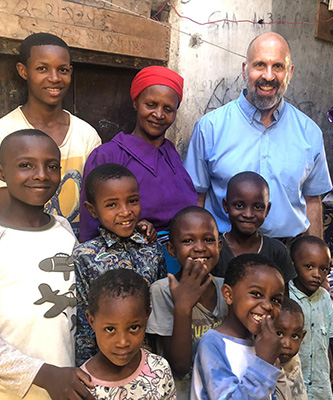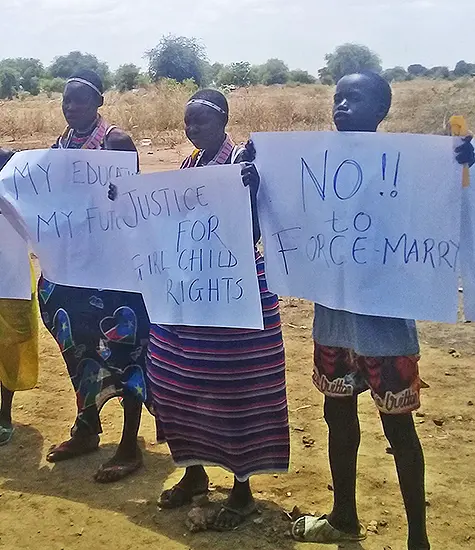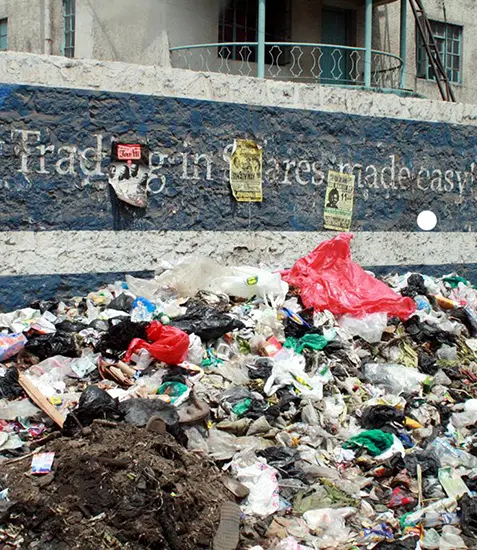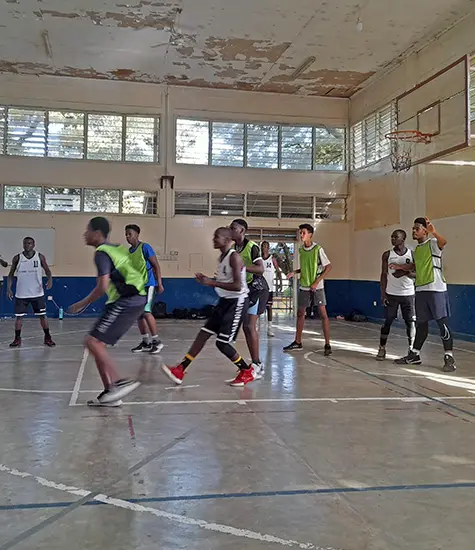Summer 2023 newsletter
Rich Tarro, Kenya

Aniki’s son Moses, Aniki, Rich and the eight grandchildren (Prince is front right, in the blue and white shirt)
My first introduction to the family was when I met Prince, who is 7 years old and in preprimary school. Every time Prince sees me, a big smile breaks out on his face. He has an infectious smile that lights up everything around him. You can’t help but feel good when you see him.
Prince should be in the first grade, but he had to repeat PP2 (the second year of preprimary school in Kenya). In October of last year, as he was getting ready for school, his mother was boiling water on a jiko (a small, charcoal-burning stove used for cooking). Prince accidentally knocked over the pot of boiling water, which fell on top of his legs, scalding them.

Prince inside one of the new bedframes
Prince spent five months in the hospital as a result of the burns. He is still not fully recovered and has trouble walking as some of the flesh on his legs is still not healed properly. He needs to undergo more treatment. Although he attends school (with some difficulty), he is not able to attend our Saturday tutorial sessions, so I unfortunately don’t get to see him that often.
We recently accepted Prince — along with six of his siblings and cousins — into the HOPE Project. Prince lives with his mother and his extended family, which consists of 12 people (three adults and nine children). After we enrolled the children in school and got them situated in their classes, we visited the family to bring them two new mattresses. They were living in two rooms of a rundown house and sleeping on the floor. We found the rooms in horrible condition, with broken doors, windows and holes in the roof where rain can enter.
This is when I first met Aniki, who cried when we delivered the two mattresses. This in turn made me tear up. She could not believe that her family now had mattresses on which to sleep.
Aniki is Prince’s grandmother — a 65-year-old widow whose husband, Joseph, passed away in 2006 after battling throat cancer. Prior to Joseph’s death, Aniki, Joseph, and her children lived in Nairobi, where Joseph was a mechanic and Aniki owned a grocery shop. After the death of Joseph, saddled with huge debts incurred from his cancer treatments, the family was forced out on the streets. Aniki had to beg for food to feed her family, and the children had to drop out of school as she had no means to pay their school fees.
Aniki’s niece, who owned a grocery shop and liquor store in Mombasa, offered to hire Aniki to work for her. Aniki moved with her children to Mombasa and began working for her niece, who opened her house to Aniki and her children. Tragically Aniki’s niece was killed in a car accident not long after that.

Two of the new beds with Rich, Teresia (Prince’s mother), Florah and Prince
After the death of her niece, her niece’s husband and his family forced Aniki from the shop and the family out of the house. Aniki and her children were again in desperate need of help. A friend then offered to let Aniki and her family live in an old house with two rooms that he owned — the place where I first met Aniki.
Aniki lives with two of her older daughters, her son, who has recently completed primary school, and her eight grandchildren. One of these daughters, Zipora, is a 38-year-old widow with four children, whose husband passed away in 2022.
The other daughter, Teresia, who is 31 years old, left her husband, who was drunk and abused her, in 2021. Teresia has liver disease and is in poor health. She is always in and out of the hospital. Teresia relies on Aniki to take care of her and her two children. Teresia is Prince’s mother.
The other two grandchildren belong to Mary, another widowed daughter of Aniki, who is 27 years old and working as domestic help in Saudi Arabia. When she left for Saudi Arabia, Mary left her two kids with Aniki.
When we visited the home to deliver the two mattresses, we immediately knew that we needed to do more. There was no way that three adults and nine children could sleep on two mattresses. We soon returned with two additional mattresses as well as four beds, sheets, and pillows.
When we delivered the additional mattresses and beds, we brought along several students to help move the items and assemble the beds. Even with a pickup truck and an SUV, we had to make two trips to fit everything. Our students did a great job with moving the beds and mattresses and assembling the beds. Aniki, Zipora, and Teresia were overwhelmed with gratitude. The kids were so excited when they saw the beds and mattresses. The day we delivered the beds and additional mattresses was one of my best days as a missioner in Kenya.

The family’s old house in disrepair
Unfortunately, this is not the end of the story, where everyone lives happily ever after. We had a lot of rain in Mombasa in April (April and May are the rainy season). It doesn’t necessarily rain all day, but we get intense downpours. That did not bode well for the house where the family was living. Not only because of the holes in the roof, but also because the structure itself was in disrepair and not structurally sound.
When we assembled the beds, we strategically positioned them in the rooms to avoid the holes in the roof and prevent the new beds and mattresses from getting wet. However, the intense rains caused the roof and walls of the house to begin to collapse. We not only had to scramble to find the family a new place to live, but we also moved them and all their belongings into the new house. Fortunately, we were able to get everyone and everything, including all the families’ belongings, as well as the new beds and mattresses, out of the house before it completely collapsed.
The new place that we found Aniki and her family is a bit of a distance away from the place that collapsed and thus it was not practical for the children to continue to attend their current schools. This meant that all the children, including the seven that the HOPE Project now supports, had to transfer to new schools. We reregistered the children in the new schools, paid their school fees at the new schools and bought them new uniforms (every school has their own different required uniform).

Rich, Florah, Zipora and five of the children with their new school uniforms (Prince is front right).
Aniki washes clothes and Zipora sells roasted corn on the side of the road to earn money for the family. With all the mouths to feed, Teresia’s health problems and Prince’s burned legs, which still need more treatment, the family barely survives on the little money that Aniki and Zipora earn.
We continue to work with family to get them back on their feet, but there is no easy solution. We also assist the family with food as part of the monthly food we give out to needy families. With HOPE supporting the seven children, at least the family does not have to worry about paying school fees and the children being sent home for lack of payment.
Aniki and her family are extremely grateful for all that the HOPE Project is doing to help them. Aniki says that we gave her back her smile, which had been long gone from her face. Although I don’t face the hardships that Aniki and her family do, I can say that witnessing their perseverance and how they stick together as a family makes me smile, on the inside — especially Prince.
Please consider joining our circle of COMPANIONS IN MISSION. Companions in Mission are generous donors, like you, who give financial gifts on a regular (usually monthly) basis. For more information visit Become a Companion in Mission. Thank you so much for your generosity!











Thank you Rich & Flora in listening to the needs of Aniki’s family.
May you both be Blessed evermore and continue to be Christ in the life of marginalized families..
Much love,
Coralis